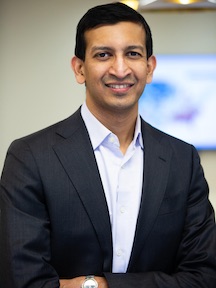By Sarah Al-Arshani
Impressive is the first word that comes to mind when thinking of Raj Chetty’s accomplishments. At only 40, Chetty (ΦΒΚ, Harvard College) has won numerous awards for his economics research, including most recently a very prestigious A.S.K Social Science 2019 Award for $200,000. The award from WZB Berlin Social Science Center recognizes Chetty’s work on the “opportunities for social mobility facing disadvantaged groups in the United States, as well as his pioneering use of large datasets on taxes, incomes, and marital status to drive research and political reform.”
Chetty is regarded for his work on upward mobility. In a 2018 IMF profile, Chetty told Chris Wellisz, “I imagined this map, and I was thinking it would be really interesting to draw this map of what opportunities for upward mobility look like based on where you grow up.”
The map in reference, was produced in 2014 and based on a paper titled “Where Is the Land of Opportunity? The Geography of Intergenerational Mobility in the United States.” It very colorfully depicts the way the neighborhood an individual grew up in impacted their income in the future.
According to the IMF, the study was a “starting point for a series of studies that have shaped the public conversation about inequality, opportunity, and race.”
According to a recent Atlantic article, Chetty graduated from Harvard in three years before earning his doctorate in economics. He was one of the youngest faculty member to be tenured in the history of Harvard’s Economics department. He was awarded a MacArthur genius grant in 2012 and the John Bates Clark Medal, which is given to the most promising economist under 40, in 2013.
Chetty was hired by Stanford University in 2015 before returning to Harvard in 2018 to launch his own research and policy institute, Opportunity Insight. The institute received funding from the Bill & Melinda Gates Foundation and the Chan Zuckerberg Initiative. Writing for the Atlantic, Gareth Cook explains that Opportunity Insights aims to apply Chetty’s findings in cities across the country and show that social scientists can “fix” the problems they write about. Cook describes Chetty as someone who, despite documenting failures in the country, is still “curiously optimistic.”
However, it’s more than Chetty’s work that’s inspirational, the story of how he became a top-rated economist is too. He may owe a lot of his success to the fortunate circumstance and achievements of his mother.
While it was not expected for girls in Tamil Nadu, a tropical state at the southern tip of the Indian subcontinent, to get an education nonetheless get a college degree, his mother’s father believed in her intellect and encouraged and supported her to continue her education. With some good luck, she eventually went on to get a college degree and become a doctor. In 1962, his parents married, and his mother supported her husband while he pursued his doctorate in economics.
When Chetty was born in New Delhi, both of his parents were professors. His father was also an adviser to Prime Minister Indira Gandhi. By the time Chetty moved to the United States at nine years old, it seems, if his research is correct… that his future success was already evident.
ΦΒΚ member Sarah Al-Arshani is a recent graduate of the University of Connecticut where she majored in journalism and political science. The University of Connecticut is home to the Epsilon of Connecticut chapter of Phi Beta Kappa.




